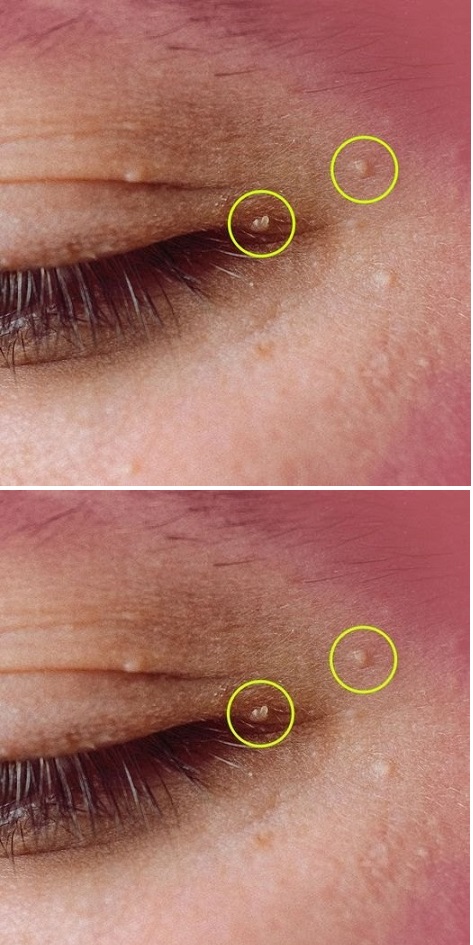
Milia are small, white, or yellowish bumps that commonly appear on the face, particularly around the eyes, cheeks, and nose. These bumps are caused by trapped keratin under the skin and are generally harmless. While they often resolve on their own, there are ways to speed up the process and prevent new ones from forming.
Steps to Remove Milia Safely
Don’t Pick or Squeeze
Avoid trying to pop or squeeze milia. Doing so can irritate your skin, cause scarring, or lead to infection.
Exfoliate Regularly
Use a gentle exfoliator with alpha hydroxy acids (AHAs) or beta hydroxy acids (BHAs), like glycolic acid or salicylic acid. These exfoliants remove dead skin cells and prevent pore blockages.
Use 2-3 times a week, depending on your skin’s sensitivity.
Cleanse Thoroughly
Wash your face twice a day with a mild cleanser to remove excess oil and impurities. Avoid harsh scrubs or overly drying cleansers, as they can irritate the skin.
Use Retinoids
Retinol or prescription-strength retinoids can help by increasing cell turnover and preventing keratin buildup. Start with a low-strength product and use it 2-3 times a week to avoid irritation.
Steam Your Face
Facial steaming can open up your pores, making it easier for trapped keratin to come to the surface. Steam for 5-10 minutes once a week and follow with a gentle cleanse.
Moisturize with Non-Comedogenic Products
Choose lightweight, non-comedogenic moisturizers that won’t clog your pores. Look for ingredients like hyaluronic acid or ceramides to keep your skin hydrated without promoting milia.
Protect Your Skin from the Sun
Use sunscreen with at least SPF 30 daily. Sun exposure can thicken the outer layer of your skin, potentially trapping keratin and worsening milia.
Consult a Dermatologist
If milia persist or are bothersome, consult a dermatologist. They may perform a lancing procedure using a sterile needle to remove the milia safely or recommend professional treatments like chemical peels or microdermabrasion.
Prevention Tips
Avoid Heavy Skincare Products
Skip products that are overly thick or oil-based, especially around the eyes.
Keep Your Skin Clean
Remove makeup thoroughly every night to prevent buildup that can trap keratin.
Exfoliate Regularly
Gentle exfoliation as part of your routine can keep your skin smooth and prevent future milia.
Be Mindful of Eye Creams
Use lightweight eye creams specifically designed for the delicate under-eye area.
When to See a Doctor
If the bumps become red, painful, or inflamed, they may not be milia and should be evaluated by a dermatologist.
By following these steps and maintaining a good skincare routine, you can reduce and prevent milia effectively while keeping your skin healthy and glowing.